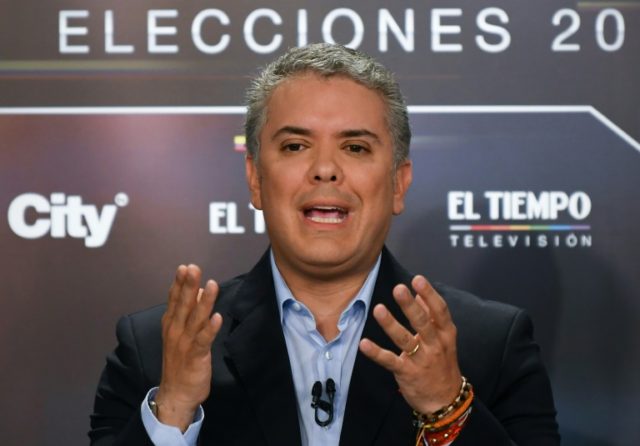Colombia is preparing to vote to replace President Juan Manuel Santos on Sunday, in an election with significant implications for both the United States and the region as a whole.
Recent polls indicate that right-wing candidate Ivan Duque is leading the race. A protégé of former President Álvaro Uribe, the 41-year-old former lawyer has promised to strengthen Colombia’s position on the world stage and prevent it from becoming like Venezuela, which is currently experiencing the worst political, economic, and humanitarian in its history that has seen hundreds of thousands flee into Colombia.
“This country has its problems and we need a young, capable leader,” 76-year-old pharmacist Alberto Solis told the Miami Herald. “And God save us from becoming Venezuela.”
In the wake of an appeasement deal with the Marxist terrorist organization Revolutionary Armed Forces of Colombia (FARC), Duque is also looking to capitalize on widespread anger over the agreement signed by current President Juan Manuel Santos in 2016. He has promised to make “structural modifications” to the deal that he claims let the communist rebels get away with war crimes.
Under the agreement, initially rejected in a referendum by the Colombian people, the group was guaranteed at least ten out of the 268 seats in the Colombian Congress until 2026 and could nominate candidates in presidential elections. However, the group withdrew from the current election in March after their presidential candidate, a terrorist leader known as “Timochenko,” suffered a heart attack.
Duque’s main opposition comes in the former of the former senator and mayor of Bogotá Gustavo Petro, a left-wing hardliner previously involved in the Marxist guerrilla group M19, who also described Venezuelan revolutionary Hugo Chávez as a “great man who was able to reduce poverty like no other Latin American leader.”
Despite his toxic associations, Petro is managing to ride an anti-establishment wave criticizing Colombia’s high levels of political corruption while also promising to help heal the burning divisions left by last year’s peace agreement.
“The left is now coming out from underneath the rock,” Sandra Borda, head of the social sciences faculty at the Tadeo University in Bogota, told The Guardian. “The peace process has opened up a space where belonging to the left no longer means association with armed groups.”
Colombia’s presidential system requires the winner to garner over 50 percent of the vote in the first round or go to a run-off. Although Duque is widely expected to top the first poll, should he fail to get the required 50 percent, the race will be left wide open.
One candidate making the outcome of a runoff more likely is Santos’s former vice president Germán Vargas Lleras, who has also warned of the perils of becoming like Venezuela but is seen as a far more moderate candidate than Duque.
“We don’t want Colombia to follow the same destiny as we’re seeing in Venezuela today,” Vargas Lleras said at a recent rally. “Mr. Petro, you are the little Maduro of Colombia and next Sunday we are going to cut you off — but democratically.”
Follow Ben Kew on Facebook, Twitter at @ben_kew, or email him at bkew@breitbart.com.

COMMENTS
Please let us know if you're having issues with commenting.